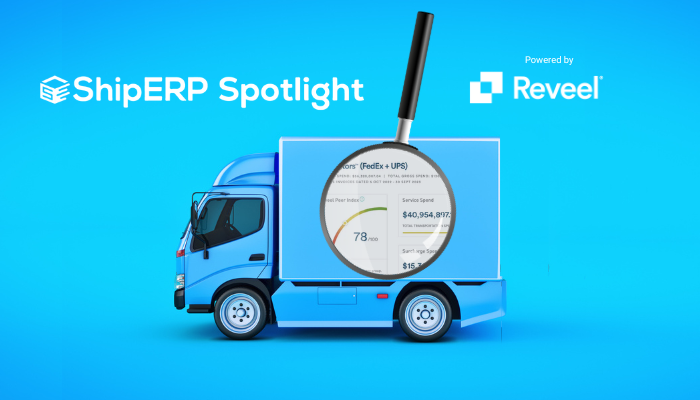Integrated Enterprise Shipping Solution Leverages Machine Learning for Advanced Parcel Spend Management

IRVINE & LONG BEACH, Calif., Nov. 14, 2023 — ShipERP, the leading multi-carrier parcel shipping software provider, today announced its partnership with Reveel, the pioneering expert in parcel spend management. This strategic partnership represents a groundbreaking milestone in both companies’ shared commitment to providing forward-thinking solutions to their valued customers. Together, both companies introduce ShipERP Spotlight, an innovative parcel shipping spend management platform that harnesses the power of AI and business intelligence to empower ShipERP customers with actionable insights that provide businesses with enhanced control over their shipping expenses and enable substantial cost savings.
Key features of ShipERP Spotlight:
- Advanced AI & Business Intelligence: Analyze over 160 million lines of shipping data for improved data-decision making with an intuitive, user-friendly interface, allowing for customizable reports and data visualization.
- Shipping Vital Factors: Engage in active shipping management with real-time visibility over key performance areas and metrics, including serving spend, surcharge spend, average cost-per-shipment, minimum charges, average shipping weight and average zone.
- Carrier Contract Management: Monitor and manage carrier contracts, revenue tiers, and discounts and receive real-time alerts when opportunities to negotiate better rates, terms and conditions with carriers arise.
- Parcel Invoice Audit: Automatically audit invoices and service legal agreements to identify overpayments and potential refunds.
- Real-time Parcel Shipping Visibility: Gain instant access to comprehensive parcel shipping data, allowing for real-time tracking of shipments, carrier performance monitoring, access to historical shipping records, and opportunities to drive savings.
- Unique Peer Index: Compare parcel shipping performance against organizations with a similar shipping profile to identify opportunities for improvement and savings.
Powered by Reveel, ShipERP Spotlight eliminates the need for businesses to hire a shipping consultant to manually comb through vast amounts of parcel spend data to find cost-saving opportunities. The platform enables a higher degree of transparency for any company to save an average of 22% shipping costs that current customers enjoy.
“Given the trajectory of eCommerce and global trade, it’s no wonder companies invest large amounts of money to painstakingly scrape through data–shipping intelligence has never been more valuable or more critical to enterprise success,” said Alan Hopper, EVP of Global Development, ShipERP. “Our partnership with Reveel to introduce ShipERP Spotlight marks a significant milestone for our customers. This new platform optimizes and automates a part of the supply chain that has historically required quite a bit of expertise and data manipulation. The result is massive cost savings for our customers.”
The strategic partnership aims to empower customers with an advanced solution that simplifies complex shipping data and enables shippers to optimize their operations and drive bottom line and top line results.
“Reveel is comprised of former carrier executives, so we’ve talked to hundreds of shippers to understand their blind spots and what information enables them to improve their operations while radically lowering costs,” Reveel’s Vice President of Partnerships, Marc Aliotta, said. “We are absolutely committed to helping shippers level the playing field with carriers. Our collaboration with ShipERP is a testament to our shared dedication to delivering value through parcel spend management.
ShipERP Spotlight is available to ShipERP customers immediately, and both companies look forward to helping businesses achieve their parcel shipping goals through this pioneering partnership. Businesses interested in integrating ShipERP Spotlight can contact Senior Product Manager, Dave McQuinn, at dmcquinn@erp-is.com.
####
Reveel is the leading Parcel Shipping Intelligence™ platform that enables companies to level the playing field with FedEx and UPS. Its unique technology enables shippers to break free of expensive parcel shipping consultants with an easy-to-use software app that brings transparency to the black box of carrier agreements. With over 17 years of parcel agreement management expertise and over $1.2B in parcel spend under management, the company’s SaaS app provides actionable insights to make smarter business decisions, optimize carrier agreements, and give shippers peace of mind. Reveel empowers customers to levergage the power of data science and peer comparison data to capture significant ROI. For more information, visit the company’s website and follow it on Twitter, LinkedIn, and Facebook.
Recognized as a leader in helping organizations seamlessly integrate shipping execution platform, ShipERP is dedicated to increasing supply chain efficiencies for businesses looking to transform their order-to-cash process via shipment optimization. The company’s flagship product, ShipERP, is the enterprise solution to fulfill your business shipping requirements. ShipERP helps businesses to seamlessly integrate over 250 shipping carriers to increase the effectiveness of their shipping operation. This allows the business to focus on reducing parcel costs as well as closely managing the shipping process to achieve better efficiencies. Experience maximum innovation and efficiency via integrated carrier rate quoting, transportation planning, shipping compliance, and other functionalities.



